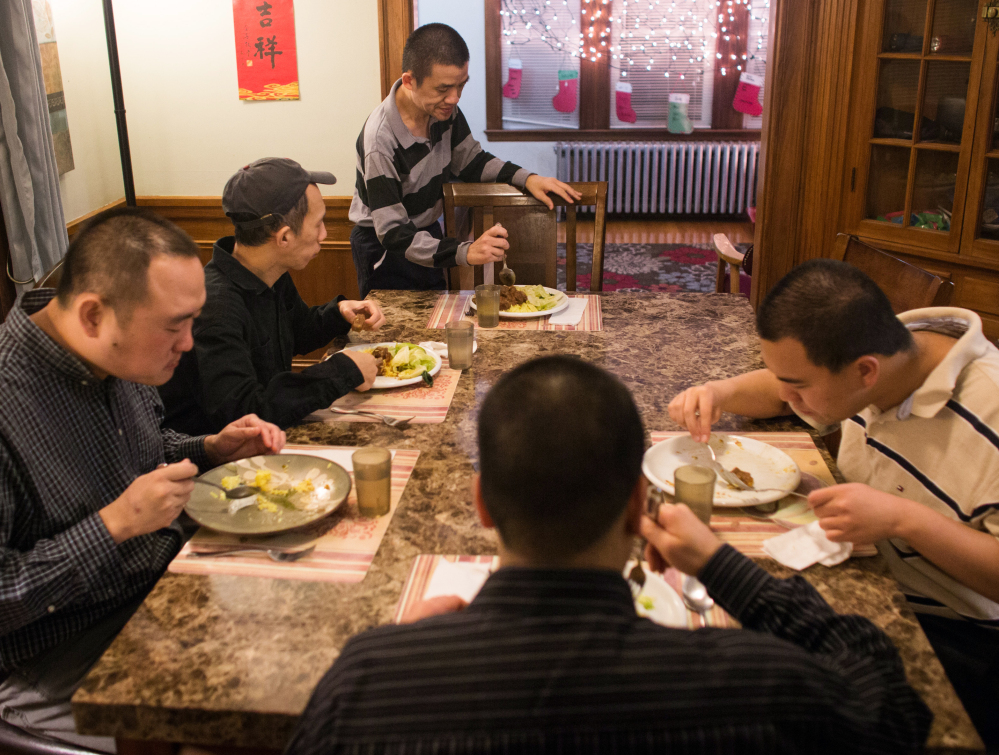BOSTON — The aroma of Asian stir-fried vegetables and pork wafted through a West Roxbury home before dinnertime on a recent Saturday. And around the table, Joseph Wong, Donald Lee, Francis Chan, Wei-Li Sun, and Wayne Wang were waiting, knowing this particular dish – written on the week’s menu posted on the refrigerator – was coming.
The table had been set by Wang, 22, and the kitchen sweep-up would later be done by Chan, 34, part of their assigned chores also listed on the refrigerator.
The men are not related, but are bound by a common Chinese heritage and by intellectual disabilities that cause each of them to crave order. Four have additionally been diagnosed with autism, and another has cerebral palsy.
They live together in this two-story white house with some Chinese decor, one of the first in the state for developmentally disabled adults that is focused on a cultural theme.
These men were brought together by their families, who felt they were better off together in a place grounded in the food, language, and culture of their upbringing, as well as with routines that meet their cognitive and emotional needs. The oldest occupant is 50.
A nonprofit human services group, the Advocates of Framingham, worked with these families on securing a location and, with the help of the state, created the home about five years ago.
The parents, who typically speak together in a combination of Mandarin, Cantonese, and English, say they – and their sons – feel totally at ease in this house.
“We wanted the group home to be more like our home,” said Grace Sun of Brookline, the mother of 32-year-old Wei-Li.
Group homes such as these are part of the national movement toward greater “cultural competence” in dealing with adults with disabilities and their families, said Jeff Keilson, senior vice president at the Advocates.
His agency, like many others across the country, has hired bilingual staff and tailors its programs to meet the needs of disabled individuals from the Latino, Asian, Portuguese, and Haitian immigrant communities, among others.
Victor Hernandez, deputy assistant commissioner of the Massachusetts Department of Developmental Services, which oversees about 2,200 group homes statewide, said it is rare for families with the same cultural background to go so far as seek a group home such as this one for their disabled children, but “when all the planets align and things fall into place, this can happen.”
In 2003, a nonprofit group, TILL, or Toward Independent Living and Learning, opened a group home in Brookline for men who wanted to follow “the traditions and cultures of Judaism,” including keeping a kosher kitchen, said a spokeswoman.
State officials said that some Spanish-speaking families tried to assemble a group home in Boston a few years back, but the effort faltered.
State officials said the department would also be receptive to families who seek a group home for disabled children for non-cultural reasons, such as a common neighborhood.
But the key issue, they said, is whether the disabled adults have compatible clinical needs and can safely – and happily –reside together.
Group homes for disabled adults can be volatile places, but so far, the Chinese-themed home has worked well, with some modifications, according to staff.
For instance, the group home coordinators generally put some distance between Wong and Chan at the dinner table. They are the most verbal of the group and know each other well, but they sometimes spat.
“They are like brothers,” said Sophia Zhu, program manager at the home.
The home is a blend of East and West. Most of the men were born in the United States and speak English. Wong, 50, the home’s most passionate sports fans, repeats the word “Terrible! Terrible!” when describing last year’s Red Sox season.
But residents of the home also sometimes hear Chan break out in melodic Chinese songs. And Sun, 32, refers to the female kitchen staff as “Ah Yi” (Auntie).
The parents and guardians admit that they – and not the men – may care most about the home’s Chinese atmosphere, enhancing their family connections.
Chan’s mother, Jenny, and Wong’s guardian, Agnes Wong, led the effort to create the home, and, along with other parents, share notes, including whether the men are getting to all of their dental and medical visits, and participating in music lessons and day programs.
Grace Sun is pleased that her son remains off any psychotropic medications, which are common in the autism population, and she is delighted that his treadmill exercise routine – listed on the schedule – has helped him shed 20 pounds off of his sizable 6-foot, 1-inch frame.
As the men ate dinner, some parents hung out in the living room, while staffer Godswill Nwaeze looked on. He said this place stands out among the other group homes where he’s worked.
As a Nigerian native, he said, he appreciates the role of culture.
Send questions/comments to the editors.



Success. Please wait for the page to reload. If the page does not reload within 5 seconds, please refresh the page.
Enter your email and password to access comments.
Hi, to comment on stories you must . This profile is in addition to your subscription and website login.
Already have a commenting profile? .
Invalid username/password.
Please check your email to confirm and complete your registration.
Only subscribers are eligible to post comments. Please subscribe or login first for digital access. Here’s why.
Use the form below to reset your password. When you've submitted your account email, we will send an email with a reset code.